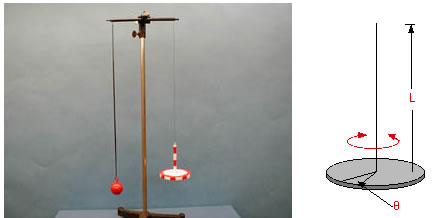Demos: 1S-06 Torsional Pendulum

Demonstrate the effect of rotational inertia on the period of a pendulum that oscillates by means of the twisting of a wire from which a disk is suspended. Determine the rotational inertia of an irregularly shaped object by comparing periods of the pendulum with and without the object attached.
If the torsional constant of the wire is given by k, then the period of oscillation is
There is no small-angle restriction on q as long as the response of the wire remains linear. However, the constant k does depend on the length of the wire, just as the spring constant k depends on the length of the spring.
If we wish to determine the rotational inertia about the axis of rotation of an irregularly-shaped object, we can place it on the disk and determine the new period. Then, if the unknown rotational inertia is I’, we have
Taking the ratio of these two equations, we get
Directions: Give the plate a twist and let it oscillate a few times to get the sense of the period (or measure it, if doing a quantitative demo). Then slide the irregular object onto the plate to show that the period increases.
Suggestions for Presentation: If you are doing this demo to show qualitative results, it might be instructive to point out that the “constant”, k, is only a constant if the wire length stays constant. You can shorten the wire to illustrate that the period decreases. Also attached to this apparatus is a ball on the end of a spring. You can show the analogous result that the spring “constant”, too, is constant only if the length remains the same. Clamp the spring at about its midpoint and show that the period decreases.
Applications: Although we don’t see them much any more, the balance wheel of a watch or clock is a torsional pendulum.
Last Updated: Nov 30, 2023 11:25 AM